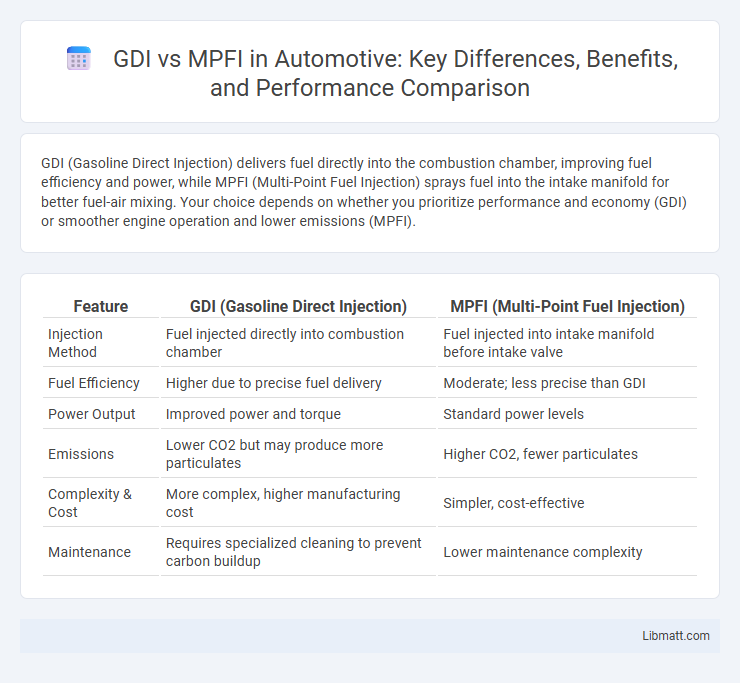GDI (Gasoline Direct Injection) delivers fuel directly into the combustion chamber, improving fuel efficiency and power, while MPFI (Multi-Point Fuel Injection) sprays fuel into the intake manifold for better fuel-air mixing. Your choice depends on whether you prioritize performance and economy (GDI) or smoother engine operation and lower emissions (MPFI).
Table of Comparison
| Feature | GDI (Gasoline Direct Injection) | MPFI (Multi-Point Fuel Injection) |
|---|---|---|
| Injection Method | Fuel injected directly into combustion chamber | Fuel injected into intake manifold before intake valve |
| Fuel Efficiency | Higher due to precise fuel delivery | Moderate; less precise than GDI |
| Power Output | Improved power and torque | Standard power levels |
| Emissions | Lower CO2 but may produce more particulates | Higher CO2, fewer particulates |
| Complexity & Cost | More complex, higher manufacturing cost | Simpler, cost-effective |
| Maintenance | Requires specialized cleaning to prevent carbon buildup | Lower maintenance complexity |
Introduction to GDI and MPFI
GDI (Gasoline Direct Injection) injects fuel directly into the combustion chamber, improving fuel efficiency and power output compared to MPFI (Multi-Point Fuel Injection), which sprays fuel into the intake manifold. GDI systems offer precise control over fuel delivery, optimizing combustion and reducing emissions. Your choice between GDI and MPFI impacts engine performance, fuel economy, and maintenance requirements.
What is Gasoline Direct Injection (GDI)?
Gasoline Direct Injection (GDI) is a fuel injection technology where fuel is injected directly into the combustion chamber of each cylinder, improving combustion efficiency and power output. By delivering fuel at higher pressure compared to Multi-Point Fuel Injection (MPFI), GDI enhances fuel atomization and allows precise control over the air-fuel mixture. This results in better fuel economy, reduced emissions, and increased engine performance.
What is Multi-Point Fuel Injection (MPFI)?
Multi-Point Fuel Injection (MPFI) is an advanced fuel delivery system where fuel is injected directly into each cylinder's intake port through multiple injectors, enhancing combustion efficiency and engine performance. It provides precise fuel metering, resulting in better throttle response, improved fuel economy, and reduced emissions compared to single-point injection systems. MPFI systems are commonly used in modern internal combustion engines to optimize air-fuel mixture and increase power output.
Key Differences Between GDI and MPFI
GDI (Gasoline Direct Injection) delivers fuel directly into the combustion chamber, enhancing fuel efficiency and power output, while MPFI (Multi-Point Fuel Injection) sprays fuel into the intake manifold, promoting better air-fuel mixing. GDI systems typically achieve higher compression ratios and reduced emissions compared to MPFI, but they may require more maintenance due to potential carbon buildup. Your choice between GDI and MPFI affects engine performance, fuel economy, and long-term reliability.
Performance Comparison: GDI vs MPFI
Gasoline Direct Injection (GDI) engines deliver superior fuel atomization by injecting fuel directly into the combustion chamber, resulting in improved power output and fuel efficiency compared to Multi-Point Fuel Injection (MPFI) systems. MPFI engines inject fuel into the intake manifold near the intake valves, providing reliable performance but less precise fuel metering than GDI, which limits maximum power and throttle response under high load conditions. GDI technology enables higher compression ratios and better combustion control, translating to enhanced horsepower and torque performance over MPFI setups, making GDI preferable for performance-oriented and fuel-efficient applications.
Fuel Efficiency: GDI vs MPFI
Gasoline Direct Injection (GDI) systems enhance fuel efficiency by delivering fuel directly into the combustion chamber, promoting better atomization and precise control over the air-fuel mixture compared to Multi-Point Fuel Injection (MPFI), which injects fuel into the intake manifold. This direct delivery allows GDI engines to operate with higher compression ratios and leaner mixtures, resulting in improved combustion efficiency and reduced fuel consumption. Studies indicate GDI engines can achieve up to 10-15% better fuel efficiency over MPFI systems under comparable driving conditions.
Emissions and Environmental Impact
Gasoline Direct Injection (GDI) engines produce lower carbon dioxide (CO2) emissions due to improved fuel efficiency compared to Multi-Point Fuel Injection (MPFI) systems. However, GDI engines tend to emit higher levels of particulate matter (PM) and nitrogen oxides (NOx), which contribute to air pollution and smog formation. MPFI systems generally have cleaner combustion, resulting in fewer particulates but slightly higher CO2 emissions, impacting overall environmental performance.
Maintenance and Reliability
GDI (Gasoline Direct Injection) systems require more frequent maintenance due to carbon buildup on intake valves, which can affect long-term reliability if not addressed. MPFI (Multi-Point Fuel Injection) engines generally offer more straightforward maintenance with fewer risks of deposit-related issues, enhancing overall reliability over time. Understanding these differences helps you optimize your vehicle's upkeep for lasting performance.
Cost and Affordability
GDI (Gasoline Direct Injection) engines typically have higher manufacturing and maintenance costs due to their advanced fuel delivery systems and precision components. MPFI (Multi-Point Fuel Injection) engines are generally more affordable, offering simpler technology that reduces repair expenses and overall ownership costs. Your choice between GDI and MPFI should consider budget constraints related to both initial purchase price and long-term maintenance affordability.
Which is Better: GDI or MPFI?
Gasoline Direct Injection (GDI) engines offer better fuel efficiency and more precise fuel control compared to Multi Point Fuel Injection (MPFI) systems, resulting in improved power output and lower emissions. MPFI provides reliable performance at a lower cost and is less prone to carbon buildup issues that can affect GDI engines. Choosing between GDI and MPFI depends on priorities such as fuel economy, maintenance, and overall engine performance needs.
GDI vs MPFI Infographic

 libmatt.com
libmatt.com